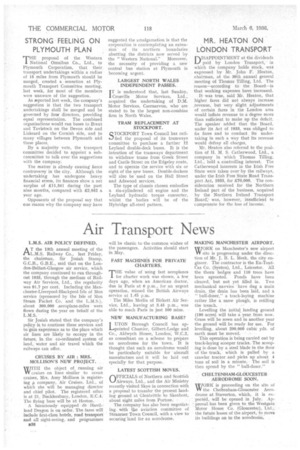, MR. HEATON ON LONDON TRANSPORT D ISAPPOLNTMENT at the dividends paid
Page 48

If you've noticed an error in this article please click here to report it so we can fix it.
by London Transport, ' in which the company holds stock, was expressed by Mr. John F. Heaton, chairman, at the 39th annual general meeting of Thomas Tilling, Ltd. The reason—according to the Board—is that working expenses have increased.
It was true, said Mr. Heaton, that higher fares did not always increase revenue, but very slight adjustments of certain fares in the London area would inflate revenue to a degree more than sufficient to make up the deficit. The speaker added that the Board, under its Act of 1939, was obliged to fix fares and to conduct its undertaking in such a way that its revenue would defray all charges, Mr. Heaton also referred to the position of H. M. S. Catherwood, Ltd., a company in which Thomas Tilling, Ltd., held a controlling interest. The Catherwood interests in the Irish Free State were taken over by the railways, under the Irish Free State Road Transport Act, 1933, for 470,000. The consideration received for the Northern Ireland part of the business, acquired by the Northern Ireland Transport Board, was, however, insufficient to compensate for the loss of income.




















































































